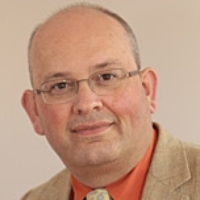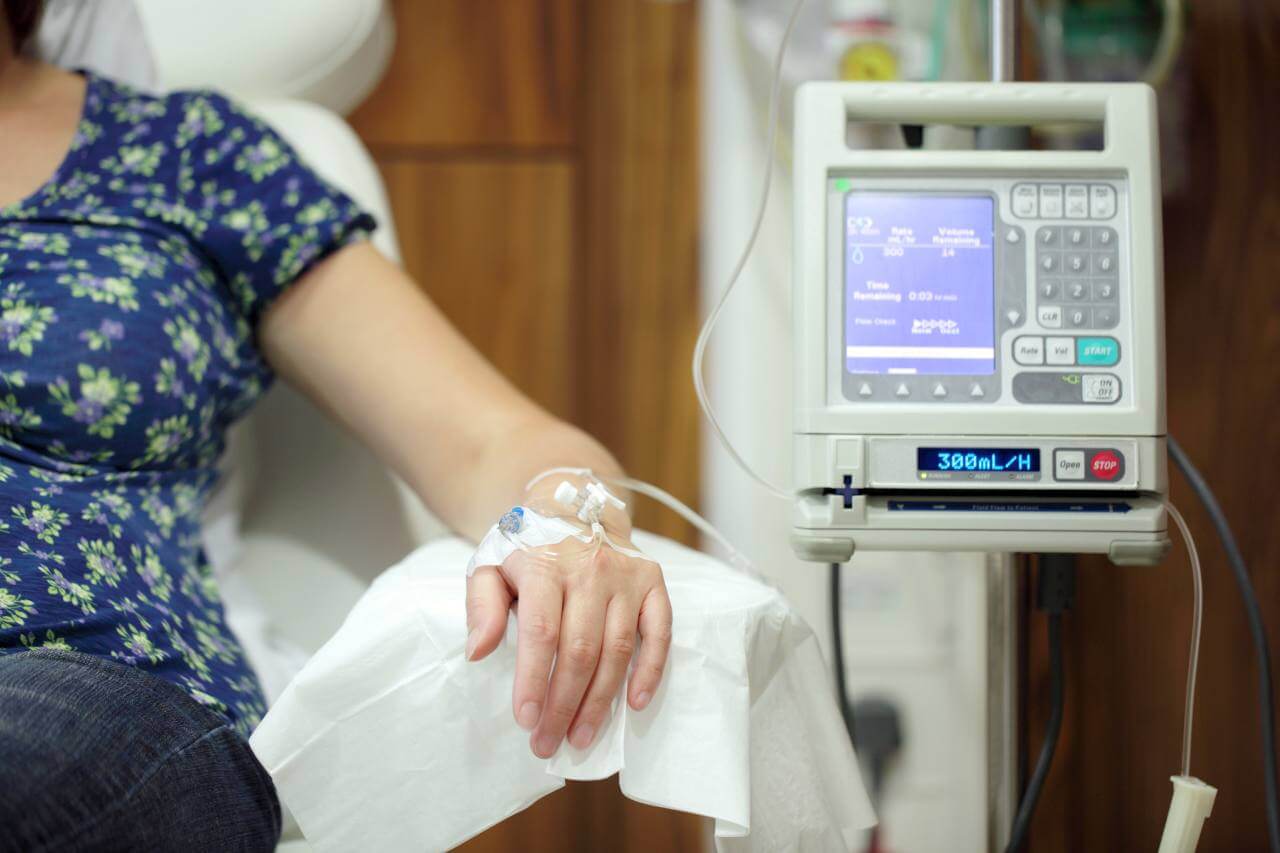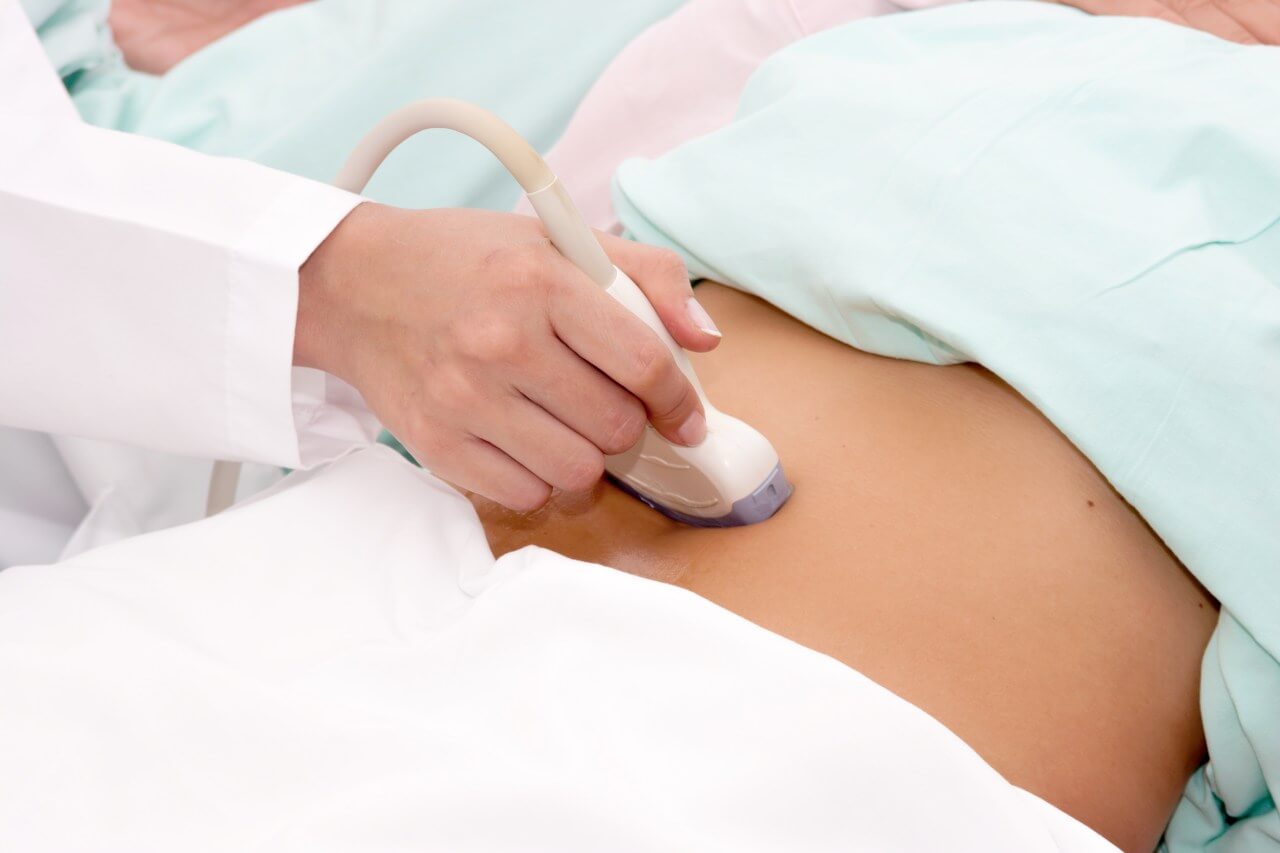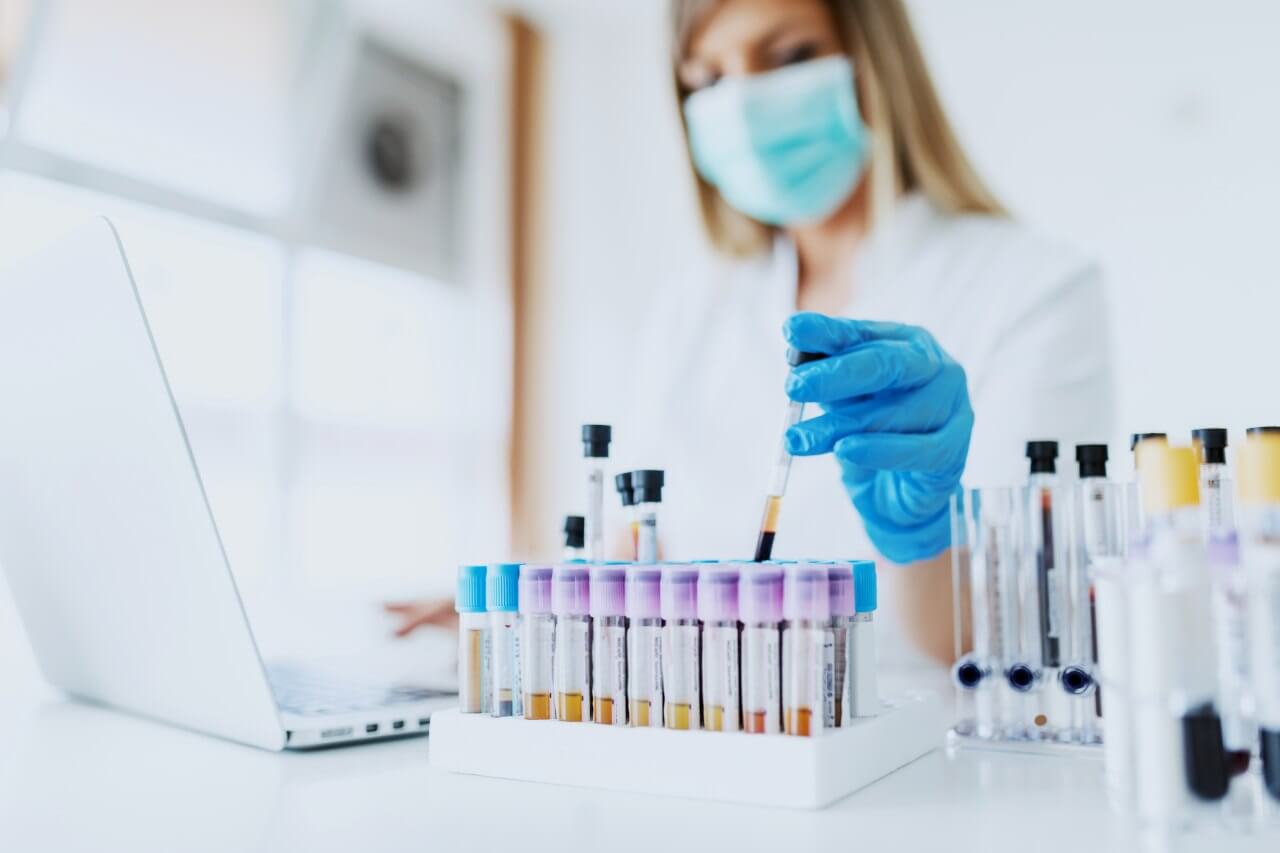
The program includes:
- Initial presentation in the clinic
- clinical history taking
- analysis of medical records
- physical examination
- laboratory tests:
- complete blood count
- biochemical analysis of blood
- TSH-basal
- tumor markers
- inflammation indicators
- indicators of blood coagulation
- ultrasound scan of the abdomen
- CT/MRI scan of the abdomen
- colonoscopy with biopsy, if indicated
- histological and Immunhistochemiсal analysis
- radiation therapy
- chemotherapy
- consultations of related specialists
- symptomatic specific treatment
- cost of essential medicines and materials
- nursing services
- control examinations
- developing of further guidance
How program is carried out
During the first visit, the doctor will conduct a clinical examination and go through the results of previous laboratory tests and instrumental examinations. After that, you will undergo an additional examination, including complete blood count, laboratory assessment of liver and kidney function. Based on the received results, the physician will elaborate the chemotherapy regimen, conduct radiotherapy planning with the help of CT or MRI, make the permanent tattoo marks on the skin and conduct CT simulation in order to assess the accuracy of the rays and the radiation dose. If necessary, related medical specialists will be involved in the elaboration of a treatment regimen (tumor board).
Chemotherapy and radiation therapy are carried out as the day hospital procedure, without mandatory admission to the hospital. At each visit, the physician will assess your general condition and the marks on the skin. After that, you will be placed in a shielded radiation therapy room, on a special table.
Each radiation therapy session lasts less than half an hour (including preparation). All this time, doctors and nurses are monitoring your condition, you can communicate with them through a loudspeaker. The procedure is completely painless. Depending on the planned course of treatment, you will visit the hospital from 1 to 3-5 times a week.
During the chemotherapy session, after the placement of a venous catheter, you will stay in a comfortable ward. An infusion system will be connected to the catheter, through which the required drug or a drug combination will be administered. All drugs are administered by intravenous drip, slowly, so the total duration of the infusion can be up to several hours. All this time, doctors and nurses will monitor your health condition closely.
After the completion of the chemotherapy and radiation therapy course, you will undergo control examinations aimed at assessing your condition and efficacy of treatment. After that you will receive the medical report with detailed recommendations regarding further follow-up and treatment. In the future, you will be able to have a distant consultation with your attending physician and schedule the next course of treatment, if necessary.
Service
You may also book:
 BookingHealth Price from:
BookingHealth Price from:
About the department
The Department of Oncology at the Prof. Harald-Robert Bruch Cancer Clinic Bonn offers a wide range of medical services in its area of specialization. The department's clinical priorities include comprehensive diagnosis of patients with suspected malignant diseases and the provision of second opinions, which helps ensure the correctness of the diagnosis and prescribed treatment. The department also has successful experience in the field of systemic cancer treatment. The department's oncologists carry out chemotherapy, targeted therapy, hormone therapy, and immunotherapy. For this purpose, the medical facility provides comfortable treatment rooms. The department's specialists cooperate with Radiation Oncology Clinics in Bonn, so patients can also receive chemoradiotherapy if clinically indicated. The therapeutic offer is complemented by nutritional counseling and psychological support for cancer patients. The department's oncology team always devotes enough time to consulting the patient and listening to their wishes. This approach allows for effective medical care that meets the patient's expectations.
The Head Physician of the department is Prof. Dr. med. Harald-Robert Bruch. The doctor has more than 25 years of successful work with patients suffering from cancer of varying complexity. Prof. Bruch has many additional qualifications, including in the fields of gastroenterology, hepatology, infectology, pain management, and drug tumor therapy. The specialist is a Member of the German Society for Hematology and Medical Oncology (DGHO), the European Society of Medical Oncology (ESMO), the American Society of Clinical Oncology (ASCO), and other professional medical societies.
The department is especially in demand for second opinions, which allow a patient diagnosed with cancer to receive an expert assessment of their clinical case from a specialized physician. Malignant diseases often require comprehensive treatment with multiple therapeutic modalities. Patients therefore seek medical help from specialized healthcare facilities and receive a second opinion on the advisability of a specific therapeutic procedure. There are also cases when the results of a repeat diagnosis within the framework of a second opinion refute a previously made diagnosis because, despite progress, there is still a problem of diagnostic errors in medicine, which can subsequently harm a person's health. The department's team of oncologists is highly professional and is always ready to help and provide independent advice on a specific clinical situation.
An equally important focus for the department's medical team is diagnostics for suspected cancer or the assessment of the results of treatment in dynamics. The department has its own modern laboratory where specialists perform general clinical and special blood tests. The department also has instrumental diagnostic rooms where clinicians perform ultrasound scans, electrocardiography, echocardiography, and pulmonary function testing. The department has modern endoscopic diagnostic rooms and special facilities for performing ultrasound-guided fine-needle aspiration biopsy. The optimal complex of diagnostic tests for each patient is prescribed individually after a detailed consultation with an oncologist and a study of the patient's anamnesis and medical history.
As for the department's therapeutic offer, doctors specialize in conservative cancer treatment with chemotherapy, targeted therapy, hormone therapy, and immunotherapy. Chemotherapy, along with surgery and radiation therapy, is one of the main methods of treating oncological diseases. Cytostatic drugs used in chemotherapy help stop the growth and division of cancer cells and prevent them from spreading throughout the body. The therapeutic effect of targeted therapy is achieved by recognizing and targeting tumor cells at the molecular level; targeted therapy is often combined with chemotherapy. Targeted drugs demonstrate high effectiveness for breast cancer, colon cancer, lung cancer, leukemias, and lymphomas. The department's oncologists are also competent in hormone therapy, which is aimed at suppressing the synthesis of the patient's hormones that stimulate the growth of a malignancy. Hormone therapy is indicated for breast cancer, prostate cancer, and other hormone-dependent tumors. The department also offers cancer treatment using immunotherapy. This is an innovative approach in oncology, the principle of which is based on stimulating the patient's own immune system to more actively kill cancer cells.
The department's range of medical services includes the following:
- Diagnostics
- Physical examination
- General clinical blood tests, myelogram, and coagulogram
- Special laboratory tests for suspected cancer
- Color-coded ultrasound scanning of the abdominal organs, lymph nodes, soft tissues, heart, and blood vessels
- Ultrasound-guided fine-needle aspiration biopsy of the bone marrow, liver, lymph nodes, and thyroid gland
- Pulmonary function tests
- Electrocardiography, echocardiography, and 24-hour blood pressure monitoring
- Bioelectrical impedance analysis
- Videocolonoscopy
- Videogastroscopy
- Colonoscopy
- Liver elastography
- Treatment
- Second opinion
- Chemotherapy
- Targeted therapy
- Hormone therapy
- Immunotherapy
- Chemoradiation therapy (in collaboration with radiation therapists)
- Other diagnostic and treatment methods
Curriculum vitae
Higher Education, Postgraduate Training, and Professional Career
- Medical studies, Faculty of Medicine, University of Bonn.
- Thesis defense, Department of Endocrinology, University Hospital Bonn. Subject: "The influence of androstenedione metabolism on cultured human bone cells."
- Clinical training in internal medicine (gastroenterology, hepatology, cardiology, angiology, pulmonology, intensive care, and emergency medical care), Siegburg Hospital; clinical training in nephrology in a group private practice.
- 1997 Board certification in internal medicine; working as an emergency doctor in the emergency service of the Rhine-Sieg region for 6 years.
- Clinical training in gastroenterology with a focus on the diagnosis and treatment of liver diseases and cancer, Siegburg Hospital.
- 1998 Board certification in gastroenterology.
- 2000 Clinical training in oncology and hematology, University Hospital RWTH Aachen and University Hospital Bochum; board certification in oncology and hematology.
- 2001 Certified by the European Society for Medical Oncology (ESMO).
- 2005 Examination Committee Member (internal medicine, hematology, and oncology) of the North Rhine Medical Association.
- 2006 Certified specialist in tumor drug therapy.
- Since 2007 Professor at the Faculty of Medicine of the University of Seville in Spain.
- 2007 - 2010 Health Economics Studies, Riedlingen University; Master of Business Administration (MBA) in Health Economics and Healthcare Management.
- 2009 Certified hepatologist, certificate from the German Society for Gastroenterology, Digestive and Metabolic Diseases (DGVS).
- Since 2009 Visiting Professor, Faculty of Medicine, University of Pecs, Hungary.
- 2010 Fellow of the European Board of Gastroenterology and Hepatology.
- 2010 - 2012 Master's Degree in Advanced Oncology, Ulm University.
- 01.12.2011 PhD, University of Pécs, Hungary.
- 2012 ESO/EMSO Masterclass, Ermatingen, Switzerland.
- 2013 Certified gastroenterologist with a focus on gastrointestinal cancer treatment, certified by the German Society for Gastroenterology, Digestive and Metabolic Diseases (DGVS).
- 12.06.2013 Habilitation.
- Since 07.05.2014 Master's Program "Advanced Oncology" Lecturer at Ulm University.
- 03.10.2014 Doctor honoris causa, András Pete Institute, Budapest, Hungary; 25.02.2019 Doctor honoris causa, Petre Andrei University, Iași, Romania; 27.04.2020 Doctor honoris causa, Progress University of Gyumri, Gyumri, Armenia; 15.12.2021 Doctor honoris causa, IIC University of Technology, Phnom Penh, Cambodia.
- 01.07.2015 Expert in second opinions in gastroenterology and oncology, Medexo.
- 16.11.2015 Venia legendi.
- Since 28.08.2018 Expert in second opinions in gastrointestinal oncology and hepatology.
- Advanced training in transfusion medicine and an internship at the Western Blood Donation Service DRK, University of Hagen; worked as a specialist responsible for blood transfusions.
- Clinical training in specialized pain management with a corresponding certificate, Center for Pain Management Bad Mergentheim.
- Clinical training in palliative care with a corresponding certificate, University Hospital RWTH Aachen and University Hospital Bochum; Visiting Lecturer in Palliative Care, Bethlehem University.
- Advanced training in quality management with a corresponding certificate.
- Advanced training in the diagnosis and treatment of blood clotting disorders with a corresponding certificate.
- Advanced training in the diagnosis and treatment of infectious diseases with a corresponding certificate.
- Certified nutritionist, certificate from the German Society for Nutritional Medicine (DGEM).
- Expert of the Commission for Medical Errors of the North Rhine Medical Association.
Memberships in Professional Societies
- German Society for Hematology and Medical Oncology (DGHO).
- German Society for Gastroenterology, Digestive and Metabolic Diseases (DGVS).
- European Society for Medical Oncology (ESMO).
- European Hematology Association (EHA).
- European Association for the Study of the Liver (EASL).
- American Society of Clinical Oncology (ASCO).
- American Society of Hematology (ASH).
- American Association for the Study of Liver Diseases (AASLD).
Photo of the doctor: (c) Onkologie Bonn / Euskirchen / Rheinbach / Wesseling
About hospital
The Prof. Harald-Robert Bruch Cancer Clinic Bonn is a highly specialized medical facility for the treatment of cancer patients. The medical complex is an academic clinic of the University of Bonn and is certified according to DIN EN ISO 9001 standards.
Special attention is given to the diagnosis of patients with suspected cancer and the provision of second opinions. The clinic's medical team specializes in systemic cancer treatment, so patients can undergo chemotherapy, targeted therapy, hormone therapy, and immunotherapy. Chemoradiotherapy is also provided in collaboration with specialized Radiation Oncology Centers in Bonn. The clinic employs competent psychologists whose responsibilities include psychological support for cancer patients.
The work of the clinic's team of physicians is based on an individual approach to each patient and their clinical case. Particular importance is attached to the initial consultation, during which the specialist studies the patient's clinical data and prescribes the necessary complex of diagnostic procedures. At the stage of developing a treatment regimen, oncologists offer the optimal course of therapy, taking into account the patient's wishes and needs. During the therapeutic process, patients receive qualified psychological assistance.
The most important value for the medical team of the Prof. Harald-Robert Bruch Cancer Clinic Bonn is the health of the patients. All the necessary technical resources are available here to provide effective healthcare in accordance with international medical standards. The clinic's doctors are highly professional. The oncologists have impressive experience in their field and regularly demonstrate good treatment success rates.
Photo: (с) depositphotos
Accommodation in hospital
Hotel
You may stay at the hotel of your choice during the outpatient program. Our managers will support you for selecting the best option.





